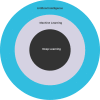A review on quantum computing and deep learning algorithms and their applications
- PMID: 35411203
- PMCID: PMC8988117
- DOI: 10.1007/s00500-022-07037-4
A review on quantum computing and deep learning algorithms and their applications
Abstract
In this paper, we describe a review concerning the Quantum Computing (QC) and Deep Learning (DL) areas and their applications in Computational Intelligence (CI). Quantum algorithms (QAs), engage the rules of quantum mechanics to solve problems using quantum information, where the quantum information is concerning the state of a quantum system, which can be manipulated using quantum information algorithms and other processing techniques. Nowadays, many QAs have been proposed, whose general conclusion is that using the effects of quantum mechanics results in a significant speedup (exponential, polynomial, super polynomial) over the traditional algorithms. This implies that some complex problems currently intractable with traditional algorithms can be solved with QA. On the other hand, DL algorithms offer what is known as machine learning techniques. DL is concerned with teaching a computer to filter inputs through layers to learn how to predict and classify information. Observations can be in the form of plain text, images, or sound. The inspiration for deep learning is the way that the human brain filters information. Therefore, in this research, we analyzed these two areas to observe the most relevant works and applications developed by the researchers in the world.
Keywords: Control; Deep learning; Fuzzy logic; Intelligent; Medicine; Neural networks; Quantum computing; Robotic.
© The Author(s), under exclusive licence to Springer-Verlag GmbH Germany, part of Springer Nature 2022.
Conflict of interest statement
Conflict of interestAll the authors in the paper have no conflict of interest.
Figures
























References
-
- Ajagekar A, You F. Quantum computing based hybrid deep learning for fault diagnosis in electrical power systems. Scopus. 2021 doi: 10.1016/j.apenergy.2021.117628. - DOI
-
- Alberts GJN, Rol MA, Last T, Broer BW, Bultink CC, Rijlaarsdam MSC, Hauwermeiren AEV. Accelerating quantum computer developments. Scopus. 2021 doi: 10.1140/epjqt/s40507-021-00107-w. - DOI
-
- Ankita S, Shikha A, Jitendra A, Sanjeev S. A review on application of particle swarm optimization in association rule mining. Scopus. 2013;199:405–414. doi: 10.1007/978-3-642-35314-7_46. - DOI
-
- Arulkumaran K, Deisenroth MP, Brundage M, Bharath AA. Deep reinforcement learning: a brief survey. Scopus. 2017;34(6):26–38. doi: 10.1109/MSP.2017.2743240. - DOI
LinkOut - more resources
Full Text Sources
